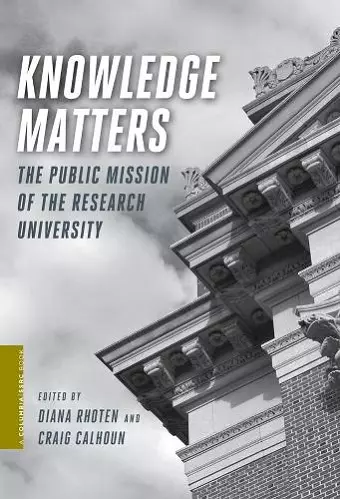Knowledge Matters
The Public Mission of the Research University
Diana Rhoten editor Craig Calhoun editor
Format:Hardback
Publisher:Columbia University Press
Published:18th Mar '11
Currently unavailable, and unfortunately no date known when it will be back

"This volume assembles an impressive array of international scholars who, individually and collectively, marshal a wide range of evidence around the very large puzzle of university transformation in the early twenty-first century. The transnational breadth of this project is its greatest intellectual strength." -- Mitchell L. Stevens, Stanford University "This collection of essays provides an unusually broad analysis of the changing public mission and purpose of the contemporary university. Its comparison of the challenges, responsibilities, and opportunities characterizing public universities around the world is particularly valuable. The book serves both as an important scholarly resource and a thoughtful analysis of key issues of importance to higher education policy." " Knowledge Matters addresses a broad range of fundamental issues regarding the public mission of the research university throughout the world. The contributors problematize the concept of both the public good and the public university and identify and analyze multiple challenges faced by universities that vary with respect to both their historical legacies/resource bases and those that characterize their countries. Several timely issues, e.g. the commodification of knowledge, are addressed albeit from different theoretical perspectives and with varying research objectives. Many chapters situate ongoing debates regarding the public character of the research university within a framework that emphasizes globalization dynamics, e.g. pressures to adapt to transnational university rankings and national quality assurance schemes.Taken as a whole this book offers theoretically provocative essays and a wealth of empirical material. Rhoten and Calhoun are to be commended for their engaged and engaging scholarly effort. Diverse "publics" will benefit from reading Knowledge Matters." "Drawing on case studies from around the world, this book contains up-to-the-minute facts and interpretations about the great transformation of public research universities in the era of neo-liberalism. Did these institutions sacrifice their public purposes, or did they change to serve public purposes more effectively and in new ways? The authors in this volume provide well-informed analyses and fresh perspectives on this important question." "This timely volume stands as a substantial contribution to our scholarly understanding of university purposes across national contexts. The editors draw together some of the best original thinking among our field's most prominent thinkers. The collection offers conceptual foundations that are certain to inspire much-needed dialogue and further research for years to come. "
Higher education can be a vital public good, providing opportunities for students, informed citizens for democracy, and knowledge to improve the human condition. Yet public investment in universities is widely being cut, often because public purposes are neglected while private benefits dominate. In this collection, international scholars confront the realities of higher education and the future of its public and private agenda. Their perspectives illuminate the trajectory of education in the twenty-first century and the continuing importance of the university's public mission. Reporting from Asia, Africa, Europe, Latin America, and North America, these scholars look at the different ways universities struggle to serve public and private agendas. Contributors examine the implications of changes in funding sources as well as amounts, different administrative and policy decisions, and the significance of various approaches to assessment and evaluation. They ask whether wider student access has in fact resulted in social mobility, whether more scientific research can be treated as an open-access resource, how changes in academic publishing change access to knowledge, and whether universities get full value from research sold to private corporations. At the same time, these chapters capture the confusion in the university sector over explaining academic work to a broader public and prioritizing its multiple purposes. Authors examine these practical challenges and the implications of different approaches in different contexts.
An impressive array of international scholars who, individually and collectively, marshal a wide range of evidence around the very large puzzle of university transformation in the early twenty-first century. The transnational breadth of this project is its greatest intellectual strength. -- Mitchell L. Stevens, Stanford University An unusually broad analysis of the changing public mission and purpose of the contemporary university. Its comparison of the challenges, responsibilities, and opportunities characterizing public universities around the world is particularly valuable. This book serves as an important scholarly resource and as a thoughtful analysis of key higher education policy issues. -- James J. Duderstadt, University of Michigan Knowledge Matters problematizes the concept of the public good and the public university and analyzes multiple challenges faced by universities. Several timely issues, such as the commodification of knowledge, are addressed from different theoretical perspectives and with different research objectives. Many chapters situate ongoing debates regarding the public character of the research university within a framework that emphasizes globalization dynamics, such as the pressure to adapt to transnational university rankings and national quality assurance schemes. Taken as a whole, this book offers theoretically provocative essays and a wealth of empirical material. An engaged and engaging scholarly effort. -- Francisco O. Ramirez, Stanford University Contains up-to-the-minute facts and interpretations of the great transformation of public research universities in the era of neoliberalism. Did these institutions sacrifice their public purposes or did they change to serve public purposes more effectively and in new ways? Contributors provide well-informed analyses and fresh perspectives on this important question. -- Steven Brint, University of California, Riverside A substantial contribution to our understanding of university purposes across national contexts. The editors draw together some of the best original thinking among the field's most prominent thinkers, offering conceptual foundations certain to inspire much-needed dialogue and further research. -- Patricia J. Gumport, Stanford University
ISBN: 9780231151146
Dimensions: unknown
Weight: unknown
560 pages